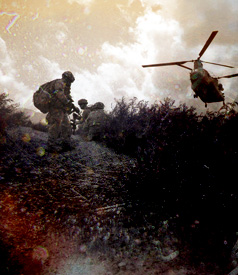As Americans usher in a new year and new decade, they find themselves confronted with old problems: war and terror. The epicenter of these problems has shifted from Iraq to Central Asia – Afghanistan/Pakistan.
According to the web site iCasualties.org, 953 American troops have died in Afghanistan since the US invasion began in 2001; more than one-third of those killed (319) died in 2009. The New York Times reported that on December 30, a suicide bomber killed at least eight CIA officers in the Khost Province in Afghanistan. On January 2, four American troops were killed when an improvised explosive device (IED) detonated while they were on foot patrol in Southern Afghanistan. With the president’s escalation of troops, these numbers should dramatically increase before they decline.
Political uncertainty continues to control the Afghan parliament and President Hamid Karzai’s ability to form a new and stable government. The Afghan parliament rejected 17 of the 24 new cabinet recommendations of President Karzai on the grounds that the nominations were not based upon the qualifications of the individuals, but founded on either bribery or ethnicity. In this new year, it looks like more of the same.
While in Phoenix speaking to the Veterans of Foreign Wars, President Obama said, “This is not a war of choice. This is a war of necessity. Those who attacked America on 9/11 are plotting to do so again. If left unchecked, the Taliban insurgency will mean an even larger safe haven from which Al Qaeda would plot to kill more Americans.” In his Nobel acceptance speech, President Obama characterized the US efforts in Afghanistan as just by saying, “There will be times when nations – acting individually or in concert – will find the use of force not only necessary but morally justified.”
President Obama is having difficulty convincing the American people that America’s continued involvement in Afghanistan is “morally justified.” In a recent CNN poll, 43 percent favor the war, and 55 percent oppose it. In a recent Associated Press Poll, 42 percent favor sending more troops into Afghanistan, while 56 percent oppose it. Essentially, the American people’s opinion regarding Afghanistan is unchanged from November.
Part of the president’s problem as he attempts to build his case for sending troops to Afghanistan is that the American people aren’t buying into his rationale that, “This is not a war of choice. This is a war of necessity … There will be times when nations – acting individually or in concert – will find the use of force not only necessary but morally justified.”
First, this was a war of choice. President Bush opted for a full scale invasion as opposed to other less invasive options that he was presented. Second, the necessity of America’s involvement in Afghanistan was not born out of 9/11, it was created much earlier.
President Obama ran on a platform that promised transparency and openness in American government. He understands better than most that the roots of America’s problems in Central Asia were planted long before 9/11. He needs to clearly articulate to the American people the circumstances that led this country into the situation in which it currently find itself. This could be better explained by understanding the “Reagan Doctrine” and what has now become know as “the Pottery Barn” rule. In 2003, then Secretary of State Colin Powell warned, “once you break it, you are going to own it … And it’s going to take all the oxygen out of the political environment …”
America’s problems in Central Asia and other parts of the world as well as the rise of the Taliban and al-Qaeda are a direct result of the Reagan Doctrine. During the1980s, the Reagan administration provided overt and covert training, supplies and aid to right-wing, anti-Soviet militias in Asia and other countries. Using the very short-sighted logic of “the enemy of my enemy is my friend,” the Reagan administration, supported by conservative think tanks like the Heritage Foundation, supported the mujahideen in their overthrow of the Soviet-backed Najibullah regime, resulting in the creation of a terrible power vacuum. The mujahideen proved to be a capable resistance force, but not capable of establishing a cohesive government.
Afghanistan is a tribally-based, ethnically diverse, nationalistic, religiously fundamental and largely illiterate country with a weak if not nonexistent central government that has been embroiled in a civil war since 1978. Within this civil war, a powerful, anti-American, religiously fundamentalist, narco-funded, resistance force has emerged. This force has changed the traditional state-based war paradigm that America is used to and has exported it to other regions around the globe. It is from the Reagan Doctrine that the necessity of America’s involvement is born, not a response to 9/11.
This necessity does not mean that the war is just and that additional American troops will solve Afghanistan’s problems. More American troops will not end the corruption in the Karzai government. Additional troops will not teach the illiterate Afghan to read and write. Thirty thousand additional troops will not stem the flow of Afghan heroin into America (the DEA’s No. 1 priority). A larger fighting force will not solve the religious conflict between the Taliban and more moderate individuals.
It is within this context that the president should redefine America’s need to be engaged in Afghanistan. If the problem is redefined, morally justifiable solutions can be implemented.
Join us in defending the truth before it’s too late
The future of independent journalism is uncertain, and the consequences of losing it are too grave to ignore. To ensure Truthout remains safe, strong, and free, we need to raise $27,000 in the next 24 hours. Every dollar raised goes directly toward the costs of producing news you can trust.
Please give what you can — because by supporting us with a tax-deductible donation, you’re not just preserving a source of news, you’re helping to safeguard what’s left of our democracy.
